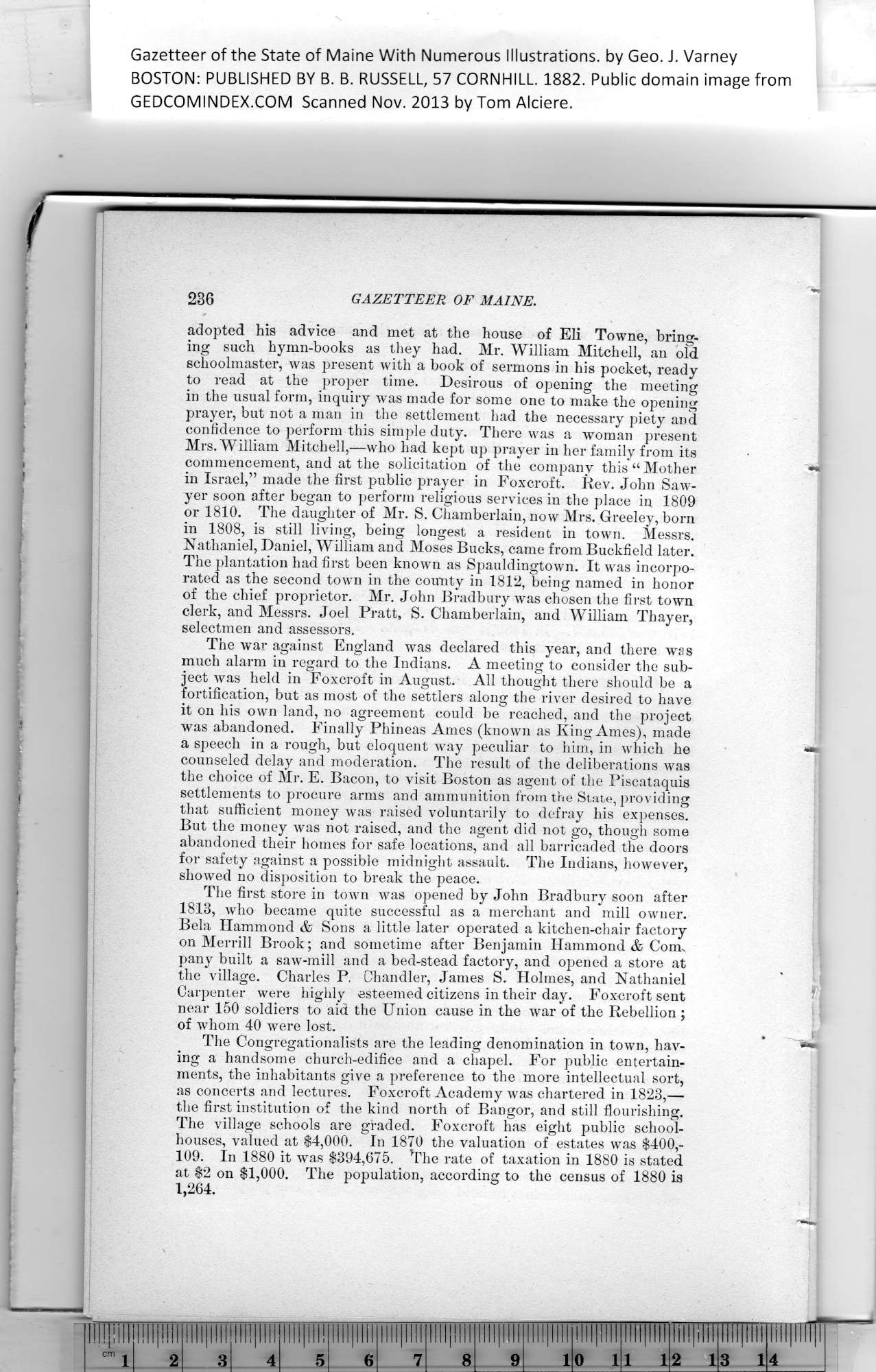|
Gazetteer of the State of Maine With Numerous Illustrations, by Geo. J. Varney
BOSTON: PUBLISHED BY B. B. RUSSELL, 57 CORNHILL. 1882. Public domain image from
236 GAZETTEER OF MAINE.
adopted his advice and met at the house of Eli Towne, bring-
ing such hymn-books as they had. Mr. William Mitchell, an old
schoolmaster, was present with a book of sermons in his pocket, ready
to read at the proper time. Desirous of opening the meeting
in the usual form, inquiry was made for some one to make the opening
prayer, but not a man in the settlement had the necessary piety and
confidence to perform this simple duty. There was a woman present
Mrs. William Mitchell,—who had kept up prayer in her family from its
commencement, and at the solicitation of the company this “Mother
in Israel,” made the first public prayer in Foxcroft. Rev. John Saw-
yer soon after began to perform religious services in the place in 1809
or 1810. The daughter of Mr. S. Chamberlain, now Mrs. Greeley, born
in 1808, is still living, being longest a resident in town. Messrs.
Nathaniel, Daniel, William and Moses Bucks, came from Buckfield later.
The plantation had first been known as Spauldingtown. It was incorjx>-
rated as the second town in the county in 1812, being named in honor
of the chief proprietor. Mr. John Bradbury was chosen the first town
clerk, and Messrs. Joel Pratt. S. Chamberlain, and William Thayer,
selectmen and assessors.
The war against England was declared this year, and there was
much alarm in regard to the Indians. A meeting to consider the sub-
ject was held in Foxcroft in August. All thought there should be a
fortification, but as most of the settlers along the river desired to have
it on his own land, no agreement could be reached, and the project
was abandoned. Finally Phineas Ames (known as King Ames), made
a speech in a rough, but eloquent way peculiar to him, in which he
counseled delay and moderation. The result of the deliberations was
the choice of Mr. E. Bacon, to visit Boston as agent of the Piscataquis
settlements to procure arms and ammunition from the State, providing
that sufficient money was raised voluntarily to defray his expenses.
But the money was not raised, and the agent did not go, though some
abandoned their homes for safe locations, and all barricaded the doors
for safety against a possible midnight assault. The Indians, however,
showed no disposition to break the peace.
The first store in town was opened by John Bradbury soon after
1813, who became quite successful as a merchant and mill owner.
Bela Hammond & Sons a little later operated a kitchen-chair factory
on Merrill Brook; and sometime after Benjamin Hammond & Com.
pany built a saw-mill and a bed-stead factory, and opened a store at
the village. Charles P. Chandler, James S. Holmes, and Nathaniel
Carpenter were highly esteemed citizens in their day. Foxcroft sent
near 150 soldiers to aid the Union cause in the war of the Rebellion ;
of whom 40 were lost.
The Congregationalists are the leading denomination in town, hav-
ing a handsome church-edifice and a chapel. For public entertain-
ments, the inhabitants give a preference to the more intellectual sort,
as concerts and lectures. Foxcroft Academy was chartered in 1823,—
the first institution of the kind north of Bangor, and still flourishing.
The village schools are graded. Foxcroft has eight public school-
houses, valued at $4,000. In 1870 the valuation of estates was $400,-
109. In 1880 it was $394,675. The rate of taxation in 1880 is stated
at $2 on $1,000. The population, according to the census of 1880 is
1,264.
PREVIOUS PAGE ... NEXT PAGE
This page was written in HTML using a program written in Python 3.2
|
